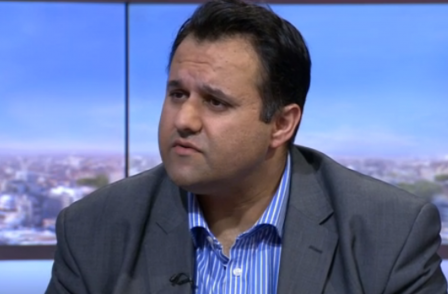
The High Court has thrown out a libel claim brought by campaigner Fiyaz Mughal OBE over a Daily Telegraph comment piece which he said branded him a Muslim extremist.
Mughal is the director Tell Mama, a group which monitors attacks on Muslims in the UK.
On 1 June 2013 the Sunday Telegraph carried a piece investigating Tell Mama which criticised the way it logged attacks on Muslims and claimed there had been an increase in such attacks after the murder of soldier Lee Rigby.
Mughal sued for defamation over a comment piece published in the Daily Telegraph on 15 June headlined: Woolwich outrage: we are too weak to face up to the extremism in our midst.
He said the piece gave the impression he was a “Muslim extremist…more extremist in his views and actions than the far-right extremists in the English Defence League" and a "hypocrite" who "falsely portrays himself as being anti extremist".
In a judgment issued today Mr Justice Tugendhat quoted the principle under article 10 of the European Convention on Human Rights that there is "little scope … for restrictions on political speech or on debate on questions of public interest."
And he also said that former Daily Telegraph editor Moore was entitled to criticise Mughal’s views without impugning his character.
The comment piece by Moore was published some three weeks after the murder of Rigby on a street in Woolwich by two Islamic extremists.
Moore said:
It is less than a month since Drummer Lee Rigby was murdered in Woolwich, yet already the incident feels half-forgotten…
..according to Tell Mama, an organisation paid large sums by the Government to monitor anti-Muslim acts, ‘the horrendous events in Woolwich brought it [Islamophobia] to the fore’. Tell Mama spoke of a ‘cycle of violence’ against Muslims…
Tell Mama equates ‘hate inspired by al-Qaeda’ with the ‘thuggery and hate of the EDL [the English Defence League]’.
Mughal’s claim centred on the following passage:
…you frequently find that Muslim groups like Tell Mama get taxpayers' money (though, in its case, this is now coming to an end). You discover that leading figures of respectable officialdom share conference platforms with dubious groups. You learn that Muslim charities with blatantly political aims and Islamist links have been let off lightly by the Charity Commission. And you notice that many bigwigs in Muslim groups are decorated with public honours. Fiyaz Mughal, for example, who runs Tell Mama, has an OBE. Obviously it would be half-laughable, half-disgusting, if activists of the EDL were indulged in this way; yet they are, in fact, less extreme than some of those Muslims who are.
In his judgment Mr Justice Tugendhat said that the piece does not identify Mughal as one of those Muslims who Moore claims are more extreme than the EDL.
And he said: “The words complained of are part of a public debate clearly identified as comment, or the opinion of the author, to the effect that the views that the claimant expresses, and for which he has received public honours, are not violent views, but are views which tend nevertheless to have dangerous consequences. That is not defamatory of the claimant. The criticism is as to the effect of his views. It is not of his character.”
A Telegraph Media Group spokesman said: “The Telegraph is pleased with today’s judgement. The column by Charles Moore was an editorial comment piece written in the aftermath of the murder of Drummer Lee Rigby and contained no defamatory element or allegation against Fiyaz Mughal, as supported by today’s verdict.
“This case followed an unsuccessful Press Complaints Commission complaint brought against The Telegraph on a different topic.”
Because the claim was issued on 15 January 2014, it was subject to the law change in the Defamation Act 2013 which means libel cases can no longer he heard by juries.
According to David Price, who represented the Telegraph, this may have had the effect of hastening conclusion of the case because it meant the judge had to rule on the meaning of the words.
Because the story itself was published last year (before the new act came into force) it was not judged under the new law.
Price said: "The judge was clearly influenced by the fact that it was a political subject and it was comment and that affected his approach as to the determination of meaning."
Advertisement
Email pged@pressgazette.co.uk to point out mistakes, provide story tips or send in a letter for publication on our "Letters Page" blog

.jpg)